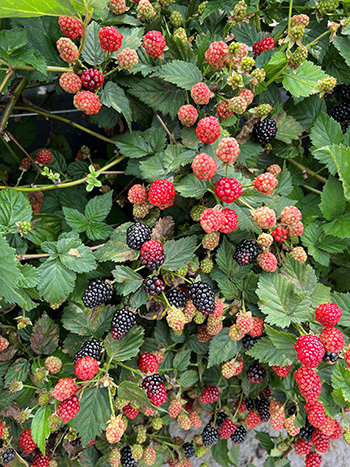Blackberries

Several blackberry species are native to Florida, and are often picked wild, but they’re usually small and the flavor varies. Cultured varieties are available that have larger, sweeter fruit.
Like most deciduous fruit plants, blackberries drop their leaves in the winter and require a certain number of hours of cooler temperatures to break buds, flower, and set fruit. Varieties that can do relatively well in North and North Central Florida include Osage, Ouachita, Ponca, Prime-Ark Freedom, Prime-Ark Horizon, Prime-Ark Traveler, and Kiowa. These varieties require less amounts of winter chilling for budbreak and flowering. Developed by the University of Arkansas, some of the cultivars are named for the Native American tribes found in that area. South Florida gardeners can try the Prime-Ark Freedom variety.
Characteristics and Care
Blackberry bushes may be erect, semi-erect, or trailing. Many blackberry cultivars are thornless.
Plant blackberry plants from February to April. During planting, do not allow the blackberry roots to dry out. Cut back the shoots to about 6 inches in length and spread the roots around the hole. Try to avoid excessive root bending and make sure to remove air pockets by compacting the soil.
Blackberries like full sun and well-drained, rich soil. Plant your blackberries close to a water source, as they will most likely need extra irrigation. Consider installing drip irrigation, which will minimize weeds, as will mulch. Blackberries don’t need much fertilizer; in fact, excess fertilizer can burn leaves or even kill plants.
In Florida, blackberries typically ripen during May and June, but University of Florida researchers are working to develop varieties that can ripen in April. The berries turn from red to black before they are fully ripe. Blackberries are extremely perishable and must be handled with care. You should refrigerate picked berries as soon as possible.
Raspberries, which are related to blackberries, are not generally recommended for the southeastern home garden.
In Florida, blackberries are considered an emerging crop, with only around 150 acres being commercially grown throughout the state. But UF researchers have been working to develop new varieties with increased yields, better flavor, and health benefits, including higher levels of antioxidant and anti-inflammatory properties.
For more on growing blackberries and other fruit, contact your county Extension office.
